#arthurian read
Photo
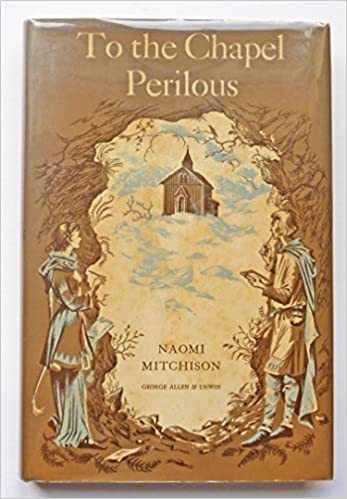
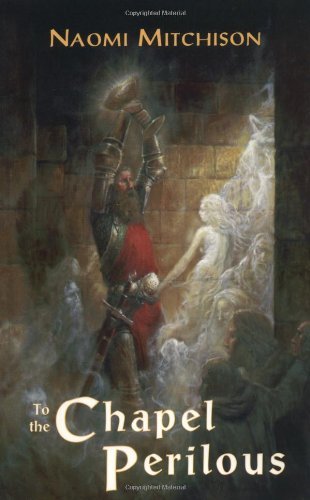
arthurian books i’ve read:
To The Chapel Perilous (Mitchison)
Historical/anachronistic retelling of the Holy Grail quest, and by anachronistic I mean that two modern-like journalists reporting stories from Camelot. No specific character focus, but definitely Grail Quest content.
13 notes
·
View notes
Text


—Vulgate Cycle: Lancelot Part II
#arthurian legend#arthuriana#arthurian legends#arthurian mythology#sir gawain#gawain#the vulgate#quotes#is this funny i think this is funny#guys read the vulgate#my post
544 notes
·
View notes
Text
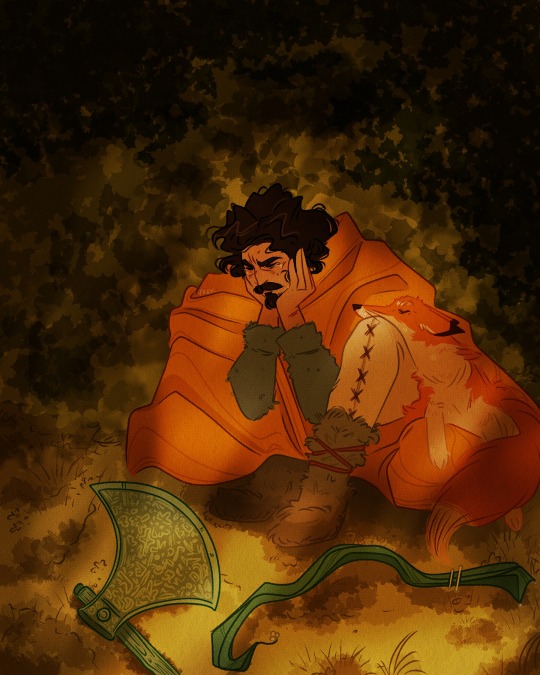
one year hence
#the green knight#a24#sir gawain and the green knight#the green knight fanart#gawain#dev patel#this is based off of Normal Rockwell's Starstruck 1976 :)#i don't know what made me remember this movie but AUGHhhhh#i saw it in a tiny wooden theater in the woods in 2021 and since I've read the actual story and i LOVE Arthurian legends#a24 really went off on this and it makes me go nuts every time i watch it#also I liked the idea of gawain getting so stressed during his cringe quest that he gets a few gray hairs#also dev patel is so pretty that was another reason i went nuts#like sir#mwah#art#artists on tumblr#digital art#csp#clips studio paint
349 notes
·
View notes
Text

Lady of the lake & baby Lancelot
[link to GRADALIS webtoon]
#gradalis#gradalis viviane#gradalis lancelot#arthuriana#just need to put this out there so it stops tourmenting me#hey come here and read my webtoon about arthurian legends#it's v queer#kochei doodles
337 notes
·
View notes
Photo
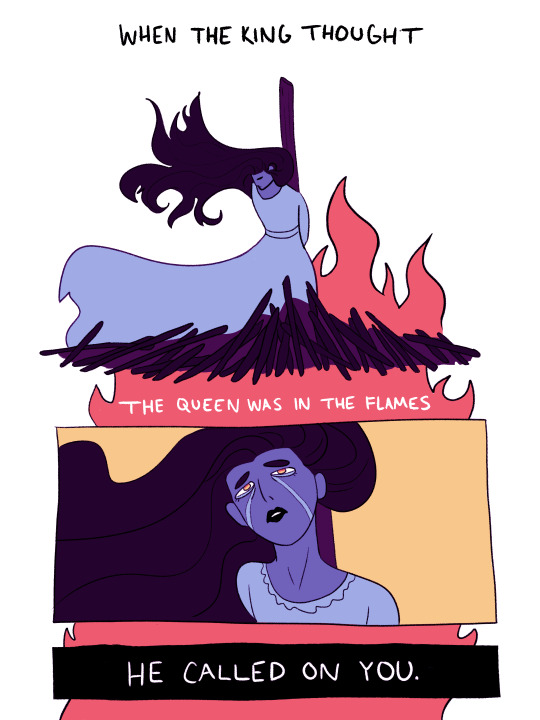
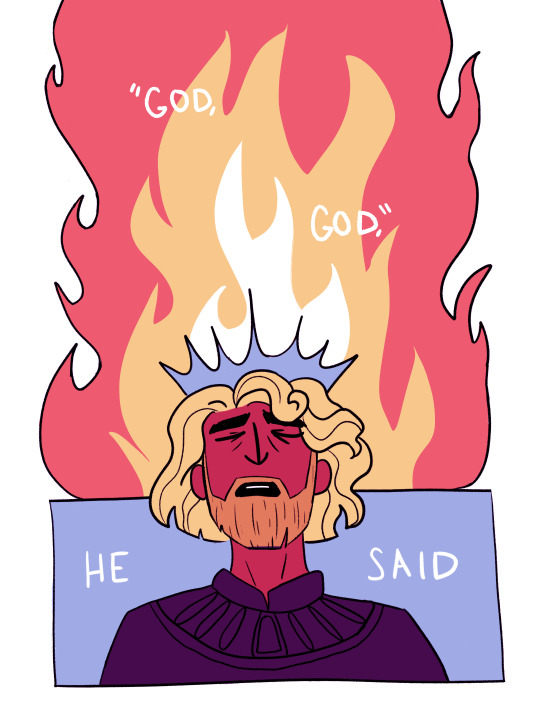

every line in e. a. robinson’s lancelot tore me to shreds but this one especially
#arthuriana#arthurian legend#lancelot#king arthur#queen guinevere#e a robinson#comic#Illustration#artists on tumblr#digital art#sir gawain#arthurian mythology#art#theartofmadeline#i read this MONTHS ago and im still not over it#ever interaction gawain and lance have in this book#makes me want to throw myself over a cliff
3K notes
·
View notes
Text
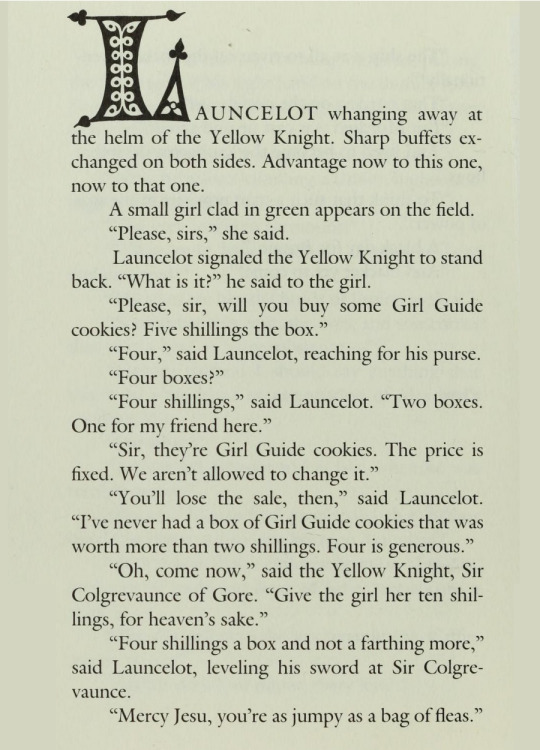
from "The King" by Donald Barthelme
#I don't know if this is necessarily a cogent novel so far but damn it's fun to read#anyway how's everybody doing. we hydrated. I've decided to put off thinking about work and think about this instead!#yay. for me.#from the bookshelf#arthurian legend
375 notes
·
View notes
Text
joining the king arthur fandom but not like the merlin tv show fandom like the old poems where arthur makes a single cameo and contributes nothing fandom
#arthur pendragon#arthurian legend#have you guys read the one where he goes to hell and beats up witches for like. ages#all to get one of his homies a wife#adapt that tv executives. i dare you
81 notes
·
View notes
Note
(about the latest drabble): I'm sorry, Welsknight's code of honor says what
Gotta love Chivalry!
Welsknight in RnS is trying is ready best to be a good knight, but he has no church to swear fealty to [unless he builds one himself] and no Knightly Order to train and be ordained with [unless he builds one himself] so unlike Helsknight, who sought out a church in hels and got knighted the Ye Olde Fashioned Way, Welsknight follows the rules of Poetic Chivalry. The more he and Helsknight have fought it out, the more Helsknight's tenets have been incorporated into Welsknight's idea of Chivalry [and Helsknight's tenets themselves are based on Chivalric Laws anyway] but still, their personal creeds are a little to the left of each other.
With that little rant out of the way, the Chivalric Laws I'm using for Welsknight are augmented from Léon Gautier's Ten Commandments of Chivalry:
Thou shalt believe all that the Church teaches and thou shalt observe all its directions.
Thou shalt defend the Church.
Thou shalt respect all weaknesses, and shalt constitute thyself the defender of them.
Thou shalt love the country in which thou wast born.
Thou shalt not recoil before thine enemy.
Thou shalt make war against the infidel without cessation and without mercy.
Thou shalt perform scrupulously thy feudal duties, if they be not contrary to the laws of God.
Thou shalt never lie, and shalt remain faithful to thy pledged word.
Thou shalt be generous, and give largesse to everyone.
Thou shalt be everywhere and always the champion of the Right and the Good against Injustice and Evil.
For the sake of RnS, which has vague gods and saints in hels, but only the gods and saints players make everywhere else, for Welsknight, all tenets about God and Church are Hermitcraft the Server and what it represents. The laws and teachings of Hermitcraft are its pledges to creativity and fairness and prosperity. He will defend it to his dying breath, because it's his home, and the living, breathing part of the universe that he and his friends create in. And any enemy of Hermitcraft is his personal enemy as well.
[I like to imagine the reason Welsknight didn't get involved in the HC x Empires crossover was because he was busy making sure the Empires crew wouldn't start a war he personally had to finish lol]
He really is trying his best.
The problem with Chivalry though, is it is inherently about crusades. Chivalric poems, while filled with a good bit of manner and courtly love, are also filled with the ideas of self sacrifice for a ruthless Good, a Good that roots out evil, with tragic grace. A Good that, ultimately, crusaded against whole countries, because Good wouldn't abide by Evil. Chivalry needs something to fight for. Otherwise it's just a basket of nice, convenient morals, a horse and a suit of armor. So you can imagine, in his own subtle, misguided way, Welsknight is actually quite happy hels exists. What good is a knight without something to fight for? Or better yet, to fight against, because it is very convenient to define yourself by everything your enemy isn't.
And his enemy isn't kind to him. His enemy must be a liar, because what he says about his worthiness as a knight can't be true. And his enemy must be cruel, because he seeks him out to hurt him. And his enemy must be relentless, because he hasn't given up yet. And his enemy is Helsknight, and everything Helsknight stands for, and apparently, Helsknight stands for quite a lot, including other people, and other people can be fought.
(He and Helsknight, despite every kick and scream to the contrary, really are a lot alike.)
#answering asks#anonymous#redstone and skulk#welsknight#helsknight#chivalryyyyyy#gotta love chivalryyyyyyy#the first time i read an arthurian novel i remember thinking it was a bit cruel#the way the characters are punished for things they couldnt know because they were chivalric missteps was always interesting#very folkloric#rns asks
107 notes
·
View notes
Text


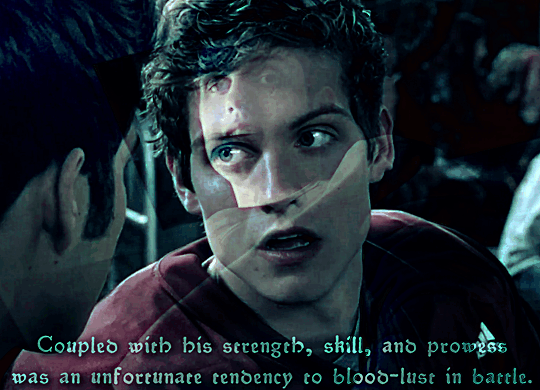

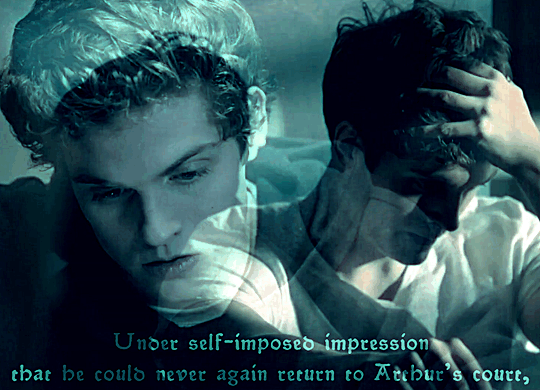
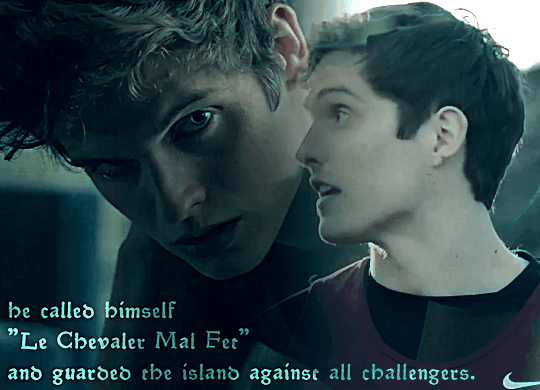
Teen Wolf as Arthurian Characters
Isaac Lahey as Lancelot du Lac
#teen wolf#twedit#teen wolf edit#twgifs#isaac lahey#lancelot du lac#lancelot#arthurian legend#arthuriana#my gifs#mine#twarthur#going into this one of the assignments i was rock solid on was allison as gwen and isaac as lancelot#cause even tho isaac and allison never had an affair the attempted love triangle in 3a and the start of 3b (which read more as a throuple)#does make them very good options for those arthurian characters on an interpersonal level as well as only personality#that being said isaac is also very lancelot coded just in general#as su said lancelot is devoted to arthur gwen and god in that order#and that's soooo isaac like even when he and allison were getting together fr he just KEPT bringing up scott being like i don't like lying#to him. boy allison argent wants to kiss you stop talking about your boy best friend
76 notes
·
View notes
Photo

arthurian books i’ve read:
Mordred´s Curse and Merlin´s Gift (McDowell)
Mordred is the main character, a lot of focus on Gawain, Arthur, Morgause, Merlin and Guinevere. Merlin is evil. Guinevere/Mordred. Warning for language?? Why is this book so vulgar
12 notes
·
View notes
Note
Hi! I really want to read the vulgate cycle but I have a hard time staying focused when reading it. Are there any sections of the vulgate that are not as important to the understanding or able to skip? Thank you so much for making all these stories accessible and thanks for your reply :))
Hello my friend! This is a great question and one I get a lot. The Vulgate Cycle is long and daunting, but I can help you navigate it!
Firstly, here is the full Vulgate Cycle PDF collection for everyone to read. Secondly, I'll summarize what you can do, and elaborate below a cut.
TL;DR
If reading a PDF, use CTRL+F to find your favorite character's name/stories.
If reading a physical copy, utilize the index (located at the very end of the Post Vulgate) to find them.
Discover chapters of interest from the summary page (also located at the very end of the Post Vulgate).
Skip The History of the Holy Grail and begin with The Story of Merlin or Lancelot I.
Now, let's break down the ways you can navigate the Vulgate Cycle step by step.
CTRL+F
This option will certainly be less effective if your favorite character is a prominent one such as Lancelot or Gawain as they appear a million times. However, if you want to learn more about someone else, say, the Lady of the Lake, you can search her up and find every instance of her appearance. Like so.
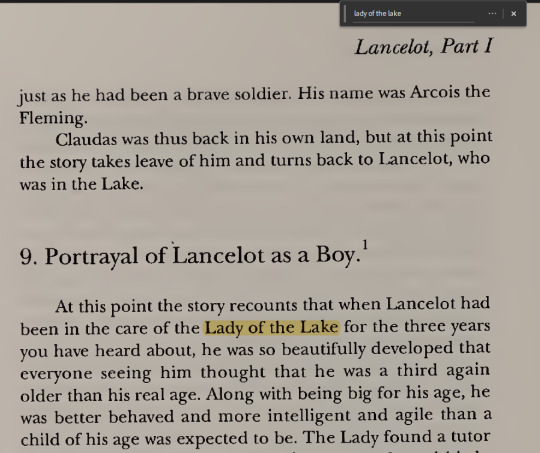
Index
In the very back of the final book of the Post Vulgate, there's an Index listing every named character [Ex: Gawain], location [Ex: Orkney Isles], entity [Ex: Holy Spirit], animal [Ex: Gringalet the horse], and language [Ex: Hebrew] mentioned in the entirety of the Vulgate Cycle. There you'll find a list of which book/chapter/page they appear in. Here are all the mentions of Gawain's horse in The Book of Merlin.

Chapter Summaries
Each book of the Vulgate Cycle has a Table of Contents with the chapter numbers and long, descriptive titles. That alone may give you an indication of what you want to read. However, at the back of the Post Vulgate, right before the Index, there's a list of every chapter in the Vulgate Cycle with a summary of events. That will give you more detail and may help you decide if you want to read in full.
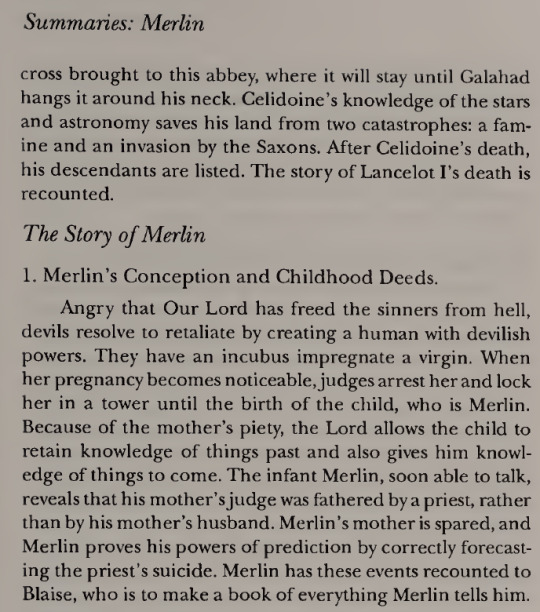
Skip
If it sucks, hit da bricks. The beauty of the Vulgate Cycle is that you don't need The History of the Grail or The Book of Merlin to understand what comes later. I enjoy them because History gives a ton of background to the religious themes the Grail Quest will eventually explore and sets up all the motifs way in advance and Merlin has the Orkney Bros as well as Yvain and Sagramore as kids which is fun. But the fact is you can begin with Lancelot I and you won't be lost. Lancelot I was written first, Merlin is a prequel, so it's optional, and the motifs of the Grail Quest are going to be heavy handed when you get there anyway without the added stuff from History. That's hundreds of pages you can skip if you want to! Norris J. Lacy, the head editor, and his translation team did a phenomenal job with footnotes throughout, so if a character off-handedly refers back to something, you can rely on them to leave a little note at the bottom for you to refresh your memory with. It'll even give you a chapter/page number if you want to refer back yourself. Here's a footnote referring to Agravaine's unnamed amie [his ladylove] who helped wing woman her sister to romance Gawain. That was 4 chapters prior to this moment.
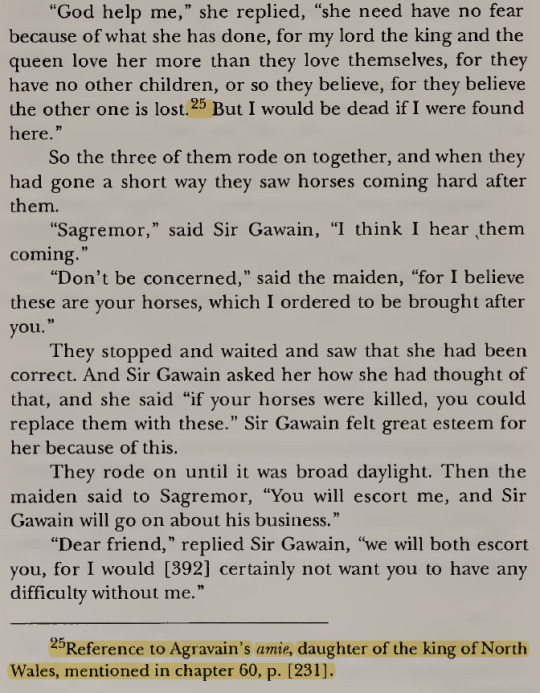
So there are plenty of ways to navigate the Vulgate Cycle and make it more digestible. That being said, it's translated so beautifully by Lacy and his team, that it reads like a modern novel. I have no doubt that once you get started, you'll become invested, and find it much easier to work through than you first thought. It's long-winded and character dense but it's fun. I do hope you're able to read it and understand why I love it so much! Thanks for this ask and I hope this helps. Have a great day!
#arthurian legend#arthurian legends#arthuriana#arthurian mythology#arthurian literature#the vulgate cycle#the vulgate#vulgate#post vulgate#quotes#resource#reading recommendations#my post#ask
70 notes
·
View notes
Text
I just need to inform you nerds about absolute madlad academic Joseph Brennan
most notably, he wrote a paper about a queer reading of Mordred in BBC Merlin which heavily cites his own (poorly photoshopped) pornographic slash manips
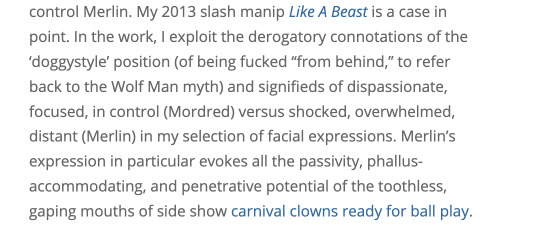
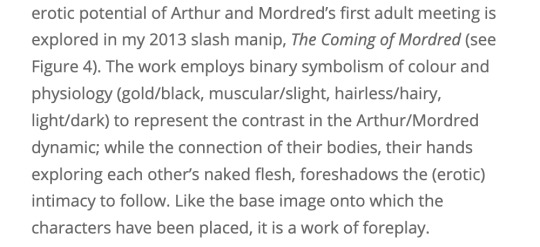
but he also edited a whole book about queerbaiting, including chapters about: Supernatural, Xena Warrior Princess, One Direction RPF, Supergirl, and the fucking Johnlock Conspiracy
all the rest of his work is about gay porn
I fucking love academia
#he has a phd in the same field I'm studying (media and communications studies). truly an inspiration#at xmas my aunt asked me 'are you going to do a phd in media? what would you do with that' I could write about gay fanfic fuck u aunt moira#although I have been talked out of writing my dissertation about arthurian legend as fandom. very sad#bbc merlin#merlin#I'll tag the other fandoms and ships mentioned. you can't read the articles without paying for it but might be interested to know it exists#supernatural#destiel#wincest#xena warrior princess#one direction#larry stylinson#supergirl#supercorp#sherlock#johnlock#tjlc#merdred
66 notes
·
View notes
Text
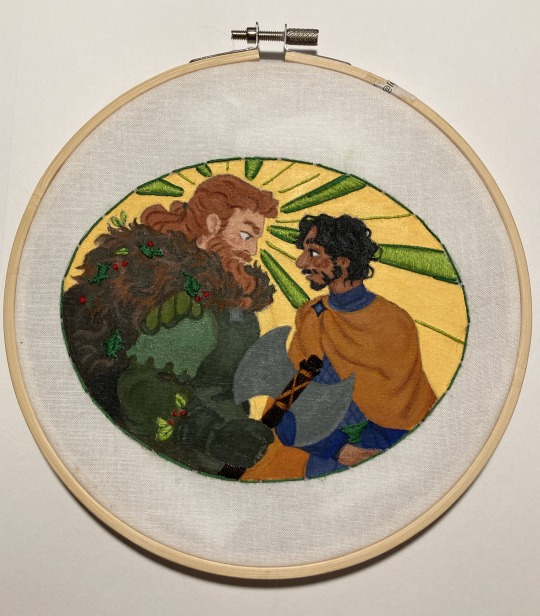
forever set in heart and stone, like all great myths of old 🗡
green knight embroidery + acrylics
#sir gawain#gawain and the green knight#arthuriana#read abt this in a queerness in medieval lit paper#went oh this looks fun then boom. late night trip to half price books and i’m a changed man#i’m so. waugh. abt it#the green knight#the movie aswell#anyway i think it’d be cool if the green knight transformed at least partially back into bertalik for the reveal#arthurian legend#newt arts
54 notes
·
View notes
Text
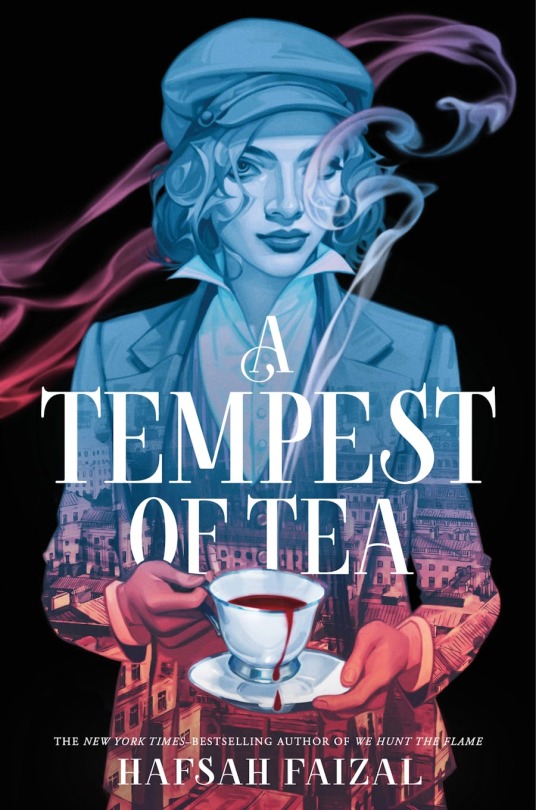
2024 reads / storygraph
A Tempest of Tea
first in a YA fantasy duology
follows a young immigrant woman in a fantasy Victorian city who runs a tearoom that doubles as an illegal bloodhouse for vampires at night
when their business is threatened, she gets a chance to save it by teaming up with her best friend, a rich girl with a talent for forgery, a vampire artist, and a mysterious city guard to do a heist to infiltrate high society and collect a logbook that may reveal the extent of the corruption in the city
fantasy city with a masked ruler, arthurian elements, themes of colonialism
#a tempest of tea#aroaessidhe 2024 reads#This has a really cool concept and worldbuilding and some fantastic characters!#I like the discussion of immigration and colonialism (I appreciate a story in this niche that’s not so white)#I like arthie and jin’s relationship and Arthie is a great character.#It definitely feels like the first half of a story - like is the arthurian stuff gonna come up more or is it just...#the mc is called arthie and has a gun she pulled out of a stone. Is there more to that lmao. it does end on a cliffhanger too.#The main thing I *didn't* like is that the middle kinda turns into…miscellaneous events purely to facilitate the characters being attracted#to each other. good for them I guess but i don’t care.#(I probably should have expected that based on the author’s other duology so that's on me I guess)#(the romances also feel on the older side of YA)#I also found that the audioboook narrator paused slightly too long between sentences.#I love having author interviews at the end of audiobooks!#which also directly called me out for guessing the obvious twist but not the multiple others directly after#(granted the obvious one I was like... genuinely confused whether it was supposed to be a twist bc I thought we already knew that)#also what's up with the coconut. lol. why that specifically
57 notes
·
View notes
Text
Hey, do you guys want to hear a story? Let me tell you about the romance between Lancelot and Guinevere, as recounted in Sir Thomas Malory's Le Morte d'Arthur.
So, I thought I knew the basics. I grew up reading modern versions of Arthurian legend that focused on other aspects, but had a general knowledge of the Arthur-Guinever-Lancelot love triangle. It didn't show up too much, but I assumed it was subtext in some other versions. What I picked up was that it was sort of pure, almost an ot3, and not the cause of a lot of problems.
My friends. In this version it is NOT SUBTEXT, it DEFINITELY CAUSED PROBLEMS, and it is WILD. It is a true will-they-won't-they drama fest soap opera romance, and I need to share. So please, come on this journey with me.
[I’m looking at you, Black Sails fandom people. I need you to know that Flint canonically would have read this. He would almost certainly have also grown up hearing these stories. I’m not saying he’s Lancelot coded, but I am saying it's interesting that he would have been aware that was something it was possible to be.]
A couple notes, before we dive in. I am very much just summarizing what happened in the book. The thing is, the book is a million pages long and also in Middle English, and this is just one of many plots, which I think is why it's not more widely known. I will show some excerpts so you can get a feel for the text, but you don’t need to read them to understand the story. I'm referring to a version that is as close to the manuscript as I can find, though with spelling regularized. For real fun, see what the original looked like. Malory purports to be translating part of the French Vulgate cycle, which likely is where the character of Lancelot originates, but in fact he is doing much more than translating, and compiles other stories as well. Point being, when he says “so the French book sayeth” etc, that is the “book” to which he is referring. Because of my lack of knowledge about the language and cultural context, this lecture series from Mythgard Academy was absolutely invaluable to my understanding. I cannot recommend it highly enough. Inevitably, some of the opinions of the prof are reflected here. I do not have it in me to compare the scholarship of various medievalists right now, I just want to tell you about this DRAMA.
Let’s start with a prophecy. When Arthur decides he wishes to marry Guinevere, Merlin advises him to take someone else, because if he takes her, she will betray him with Lancelot and it will destroy his kingdom. All of this is foretold, not only to us, but to Arthur himself. Of course he takes her anyway, and all is doomed from the start.
As we begin the main arc of this story (several books after the prophecy), Lancelot is widely acknowledged to be the best and most renowned knight of Arthur’s court. He is plainly and hopelessly in love with Guinevere, and she loves him in return. Arthur doesn’t have a problem with this - who wouldn’t love Guinevere? This sort of love is socially acceptable, so long as they do not sleep together, which would be treason. Arthur in fact seems to support their love, because it means that Lancelot will be Guinevere’s champion should she need one. This is a role Arthur himself legally cannot fill because he is the king, and so would have to be the judge. Lancelot is indeed a good champion for her, and fights for her when she is wrongly accused of murder.
Lancelot is deeply chivalrous, in a way that seems sincere. This is a great place for a first excerpt, a conversation with a Random Damsel Lancelot has been helping:
‘Now, damosel,’ said Sir Lancelot, ‘will ye any more service of me?’ ‘Nay, sir,’ she said, ‘at this time, but almighty Jesu preserve you wheresoever ye ride or go, for the most courteous knight thou art and meekest unto all ladies and gentlewomen that now liveth. But one thing, sir knight, me thinks ye lack, ye that are a knight wifeless, that ye will not love some maiden or gentlewoman. For I could never hear say that ever ye loved any of no manner of degree, and that is great pity. But it is noised that ye love Queen Guenivere, and that she hath ordained by enchantment that ye shall never love no other but her, nor no other damosel nor lady shall rejoice you; wherefore there be many in this land of high estate and low that make great sorrow.’ ‘Fair damosel,’ said Sir Lancelot, ‘I may not warn* people to speak of me what it pleaseth them; but for to be a wedded man, I think it not; for then I must couch with her, and leave arms and tournaments, battles and adventures. And as for to say to take my pleasance with paramours, that will I refuse, in principal for dread of God. For knights that be adventurous should not be adulterers nor lecherous, for then they be not happy nor fortunate unto the wars; for either they shall be overcome with a simpler knight than they be themselves, or else they shall slay by unhap and their cursedness better men than they be themselves. And so who that useth paramours shall be unhappy, and all thing unhappy that is about them.’
So after doing his Knightly Deeds for this damsel, Lancelot asks if she needs anything else. She says no, but you are lacking one thing, which is the love of a woman. It is rumored that is because Guinevere has through sorcery made you love only her, and that causes all of the women great sorrow. In reply Lancelot makes this speech about how he cannot have a wife or paramour and be a good knight, but everyone thinks it is at least in part because his love is reserved for Guinevere.
Now, throughout the book his chastity DOES notably cause all of the women great sorrow. Everyone wants to sleep with Lancelot. Literally he is kidnapped by the four most beautiful queens other than Guinevere, and they say he has to choose one of them as a lover (not even a wife, a lover) or else die. He says he would rather die, though in the end he escapes. This is just an example, truly it is a recurring problem for him. He is, at one point, tricked into sleeping with a woman with whom he conceives his son Galahad (as was prophesied, it's a long story and the romance is only part of it. It is worth mentioning that something similar happens to Arthur, which is how Mordred is sired.) When Guinevere learns that Lancelot has been with someone else, she is angry and banishes him from the court. They still love each other and eventually reconcile.
So, Lancelot goes on the quest for the holy grail. But he fails, specifically because while he is outwardly dedicated to God, in his private heart he is still dedicated to Guinevere. And so he makes a vow to renounce his love for her, acknowledging that it is beyond measure (beyond what is right, even if they have not technically done anything wrong.) However when he returns to Camelot, he cannot keep this vow, as we see.
Then, as the book saith, Sir Lancelot began to resort unto Queen Guenivere again, and forgot the promise and the perfection that he made in the quest. For, as the book saith, had not Sir Lancelot been in his privy thoughts and in his mind so set inwardly to the Queen as he was in seeming outward to God, there had no knight passed him in the quest of the Sangrail, but ever his thoughts were privily on the Queen. And so they loved together more hotter than they did beforehand, and had many such privy draughts together that many in the court spoke of it, and in especial Sir Agravain, Sir Gawain’s brother, for he was ever open-mouthed. So it befell that Sir Lancelot had many resorts of ladies and damosels that daily resorted unto him to be their champion: in all such matters of right Sir Lancelot applied him daily to do for the pleasure of Our Lord Jesu Christ. And ever as much as he might he withdrew him from the company of Queen Guenivere for to eschew the slander and noise, wherefore the Queen waxed wroth with Sir Lancelot.
He and Guinevere start spending a lot of time alone together, and so there are rumors circulating about them in court. In order to put a stop to the rumors, Lancelot starts paying other women attention and doing more good knightly deeds for them. Guinevere is terribly jealous, but he tells her it's for their own good, and also tells her about the vow he made, and his concern that their love is beyond what is appropriate. She is devastated, and weeping banishes him from the court (again).
Lancelot then rides in a tournament, disguised. (Why? Because this is simply a thing knights do.) To make it an effective disguise he takes the token of a woman, the sleeve of the fair maid of Astolat to wear on his helm. When she discovers that he was only using it for the disguise, and he does not indeed love her, she is so heartbroken that she says if he will not marry her or be her lover, she will die. He refuses, on the grounds that love must not be constrained and should arise from the heart, and offers her a thousand pounds a year instead if she marries anyone else. Properly insulted by this, she does indeed die. She has her body sent in a boat to Camelot, with a letter in her hand, saying that she died of her love for him, that he would not return.
Seeing this, Guinevere reconciles with Lancelot, presumably reassured by the fact that he would let this very beautiful much younger woman die of her love rather than being with her. She insists that from now on he will not fight in disguise, and will openly bear her token.
Then Queen Guenivere sent for Sir Lancelot, and said thus: ‘I warn you that ye ride no more in no jousts nor tournaments but that your kinsmen may know you; and at these jousts that shall be ye shall have of me a sleeve of gold. And I pray you for my sake to force* yourself there, that men may speak you worship. But I charge you as ye will have my love, that ye warn your kinsmen that ye will bear that day the sleeve of gold upon your helmet.’ ‘Madam,’ said Sir Lancelot, ‘it shall be done.’ And either made great joy of other.
It is important to keep in mind that, to this point, there is no textual evidence that they were sleeping together, and a great deal of evidence that it was important to Lancelot that they not cross that line. There is much less evidence that this is important to Guinevere.
So then one fateful day in May, Guinevere goes picnicing with an entourage of knights. They are captured by someone else who is in love with Guinevere, and taken back to his castle, but she manages to send a message to Lancelot. At the castle, she insists that her knights sleep in her bedchamber on the grounds that they were wounded in the battle when she was captured and need tending, but truly she wants them there to keep her captor from raping her.
Lancelot arrives to rescue her, and the person who kidnapped her agrees to give her back in the morning. She tells Lancelot to visit her room in the night. He climbs up to her window, which is barred. They have a heartfelt reunion and she says she wishes he could come in to her. He acquiesces and breaks the bars to get into her room, cutting his hand to the bone to do so. Despite the profusely bleeding wound and the ten other men sleeping in the room, they at last do sleep together, in this passionate blood covered consummation. He sneaks back out and replaces the bars.
In the morning, the man who kidnapped Guinevere comes in and sees blood all over the bed. He accuses her of being unfaithful to the king, saying she lay with one of the knights who had been sleeping in her room. She denies it, but it is very clear that she did sleep with someone who was bleeding.
Lancelot says he will fight to defend her from this accusation, which is right and proper because he is her champion. In this story people take trial by combat and oaths before God very seriously, especially Lancelot. He really does try. So he swears an oath that he will prove with his life that Guinevere did not sleep with one of the wounded knights who lay in her room. This of course is TRUE, but only on a technicality. Lancelot, having slept with her himself the night before, is also the one who defends her honor after. I love this story so much.
Instead of fighting him, the kidnapper takes Lancelot captive. In captivity he encounters ANOTHER damsel who insists that sleep with her in order for her to help him. He refuses, still faithful in his heart to Guinevere. Eventually she settles for him holding and kissing her, which is not across the line of appropriateness apparently, giving us some idea of where that line is drawn. Anyway, Lancelot gets out, fights for Guinevere and wins. There are indications that he feels like he barely dodged a devine bullet.
Guinevere and Lancelot return to Camelot. Finally the rumors about them are true, the deed has been done, but of course nothing appears particularly different as there were already rumors about them. Two knights, Mordred and Agravaine, who have been intriguing against Arthur already, go and tell Arthur that Guinevere is being untrue to him. Here is his response:
‘If it be so,’ said the King, ‘wit you well, he is none other; but I would be loath to begin such a thing but I might have proofs of it. For Sir Lancelot is a hardy knight, and all ye know that he is the best knight among us all; and but if he be taken with the deed he will fight with him that bringeth up the noise, and I know no knight that is able to match him. Therefore, and it be sooth as ye say, I would that he were taken with the deed.’ For as the French book saith, the King was full loath that such a noise should be upon Sir Lancelot and his queen. For the King had a deeming of it; but he would not hear thereof, for Sir Lancelot had done so much for him and for the Queen so many times that, wit you well, the King loved him passingly well.
Arthur says he will not hear of this without proof, because if Lancelot is accused and allowed to fight he would beat anyone. And, it is said that Arthur had some idea of the affair, but would not credit it because Lancelot had done so much for him and Guinevere, and he loved Lancelot greatly.
So, one night when the king is away hunting, the two accusers contrive to catch them in the act, with a group of twelve armed knights. They do find Lancelot in Guinevere’s chamber, but the text is notably, pointedly vague about whether they are actually in bed. In any case, Lancelot asks for a trial. The knights say no, they have caught him and so may kill him. He is Lancelot, so he kills all of them instead, save one (Mordred) whom he leaves wounded. Lancelot flees, intending to return to rescue Guinevere and take her to his own castle to protect her from Arthur’s wrath. He maintains her innocence, and still intends that they will all reconcile.
Guinevere is to be burned at the stake (normal in this situation). Lancelot rescues her from the burning at the last moment, killing a number of knights of the round table. Arthur seems to blame the accusers more than Guinevere and Lancelot (for good reason; keep in mind that the romance is a subplot, there is a great deal of political intrigue going on.) Now a war will begin, whether anyone wants it or not, because of the people Lancelot killed. Lancelot takes Guinevere to his own castle. Battle lines are drawn, and Lancelot and Arthur confront each other in the fighting:
And ever was King Arthur about Sir Lancelot to have slain him, and ever Sir Lancelot suffered him and would not strike again. So Sir Bors encountered with King Arthur; and Sir Bors smote him, and so he alit and drew his sword and said to Sir Lancelot, ‘Sir, shall I make an end of this war?’—for he meant to have slain him. ‘Not so hardy,’ said Sir Lancelot, ‘upon pain of thy head, that thou touch him no more! For I will never see that most noble king that made me knight neither slain nor shamed.’ And therewith Sir Lancelot alit off his horse and took up the King and horsed him again, and said thus: ‘My lord the king, for God’s love, stint this strife, for ye get here no worship and I would do my utterance. But always I forbear you, and ye nor none of yours forbear not me. And therefore, my lord, I pray you remember what I have done in many places, and now am I evil rewarded.’ So when King Arthur was on horseback he looked on Sir Lancelot; then the tears burst out of his eyes, thinking of the great courtesy that was in Sir Lancelot more than in any other man. And therewith the King rode his way and might no longer behold him, saying to himself, ‘Alas, alas, that yet this war began!’
So Arthur tries to slay Lancelot, but Lancelot, the better fighter, refuses to slay him and indeed when Arthur is unhorsed Lancelot forbids that he be slain, and gives him his own horse. Arthur weeps for the honor that is in Lancelot, and laments that the war began.
The pope intervenes and tries to negotiate an end. Lancelot confirms that he is willing to return Guinevere to Arthur, and says he has always been willing to do this and will still defend her honor, but that he does not feel he can do so because Arthur has listened to liars and been misled, and he had more reason to take her away than the accusation of adultery - he does not trust she can be safe in that court, with things as they are.
Eventually they do make a deal, with some assurances, and he surrenders Guinevere to the king. He kisses her openly, says that he will leave, but should she be in danger or ever again accused of being untrue, he will fight for her as he always has. He departs the court forever, to much great sorrow, and returns to his own lands.
The war continues - eventually Mordred seizes the throne, Arthur kills him in battle but is mortally wounded himself and passes to Avalon. Following the king’s death, although her love would no longer be adulterous, Guinevere retires to a convent rather than reuniting with Lancelot. He seeks her out, and this is her reaction:
Sir Lancelot was brought before her; then the Queen said to all those ladies, ‘Through this same man and me hath all this war been wrought, and the death of the most noblest knights of the world; for through our love that we have loved together is my most noble lord slain. Therefore, Sir Lancelot, wit thou well I am set in such a plight to get my soul health; and yet I trust through God’s grace and through His Passion of His wounds wide, that after my death I may have a sight of the blessed face of Christ Jesu, and at Doomsday to sit on His right side;* for as sinful as ever I was, now are saints in heaven. And therefore, Sir Lancelot, I require thee and beseech thee heartily, for all the love that ever was betwixt us, that thou never see me no more in the visage. And I command thee, on God’s behalf, that thou forsake my company; and to thy kingdom look thou turn again, and keep well thy realm from war and wrack. For as well as I have loved thee heretofore, my heart will not serve now to see thee, for through thee and me is the flower of kings and knights destroyed. And therefore go thou to thy realm, and there take ye a wife and live with her with joy and bliss. And I pray thee heartily to pray for me to the everlasting Lord that I may amend my misliving.’ ‘Now, my sweet madam,’ said Sir Lancelot, ‘would ye that I should turn again unto my country, and there to wed a lady? Nay, madam, wit you well, that shall I never do, for I shall never be so false unto you of that I have promised. But the self* destiny that ye have taken you to, I will take me to, for the pleasure of Jesu; and ever for you I cast me specially to pray.
Rather than rejoicing in Lancelot’s presence, Guinevere laments that their love brought about the downfall of the Arthurian court, and the deaths of the knights of the round table and King Arthur. She calls upon Lancelot, by all the love that was ever between them to leave her presence, telling him to marry someone else if he wishes and see her no more. Lancelot replies that he wants no one else, and that he will respect her wishes, but will also renounce the world and join a religious order. He asks Guinevere for a final parting kiss, which she denies him.
When Guinevere lies dying of illness, Lancelot sets out to go to her, having had a vision. She knows of his coming, and prays to die before she sees him, because she cannot bear it. She dies a half hour before he arrives, leaving instruction that he is to tend to her body, and then lay it to rest beside that of her lord King Arthur. Lancelot does this with great sorrow, and after ceases to eat or drink, and within weeks is dead himself.
And there you have it, the love affair that doomed Camelot.
HUGE DISCLAIMER: Any and all mistakes or misinterpretations are my own. This is what I gathered, but I am not a medievalist. I am barely an interested layperson. I’m just a random fic writer who got obsessed with research for a story, and had to share this tragic mess.
#i have a million thoughts about this#and there is a great deal of context that would be helpful#but i this doesnt need to be more than 4k words long so#i may do a followup post if there is interest#but black sails folks#i'm writing a lot of flintmadi convos right now#and vaguely planned to have them talk about this book#as a way to discuss their own situation and values#but i had not actually read it#and it is WAY MORE than i expected#anyway they are going to refer back to it#so i figured i should write it down so i can point at it if readers want to know wtf they are talking about#is there an#arthurian legend#tag?#i purposefully haven't looked i don't go here if there is a here to go#but fuck it that was a lot of work might as well see#anyway there are so many things to dig into here#arthur's role or lack thereof#(the rest of the book has a lot more to do with him)#the treatment of fate and prophesy#the courtly love tradition#how this fits into the arthurian tradition as a whole#and the clear french influence#vs the old celtic stories#also so many fun things about language in general#did you know that paramour is derived basically the same way as paramilitary?#'para' as 'beyond that which is regular'#also in middle english negatives are additive rather than canceling each out out!#fun facts
83 notes
·
View notes
Text


#the worst lay that ever harper sang with harp or with any other instruments oh malory read him to FILTH#poor guy#le morte d'arthur#thomas malory#arthuriana#arthurian literature#arthurian legend#sir dinadan#dinadan#would you believe that i created this from a mikey way rolls worst joint ever asked to leave my chemical romance meme#you can catch a sliver of a glimpse of mikey just under the left hand photo lmaoo#knights#knights of the round table#medieval literature
38 notes
·
View notes